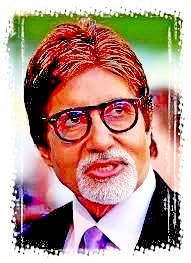Introduction: Amitabh Bachchan, often hailed as the “Shahenshah” (Emperor) of Indian cinema, is a name that resonates across generations. With a career spanning over five decades, Bachchan has left an indelible mark on the Indian film industry and has become a global icon. From his towering presence on screen to his resonant baritone voice, Bachchan’s persona exudes charisma and magnetism, captivating audiences worldwide. In this comprehensive exploration, we delve into the life, career, and enduring legacy of the legendary actor, tracing his remarkable journey from humble beginnings to superstardom.
Early Life and Background: Amitabh Bachchan was born on October 11, 1942, in Allahabad, Uttar Pradesh, India, to Harivansh Rai Bachchan, a renowned Hindi poet, and Teji Bachchan, a social activist. Raised in a family deeply rooted in literary and cultural pursuits, Bachchan was exposed to the arts from a young age. Despite his family’s intellectual background, Bachchan faced financial struggles during his childhood. His father’s poetry often dealt with themes of social justice and equality, which deeply influenced Bachchan’s worldview.
Educational Pursuits and Early Career: Bachchan pursued his education at Sherwood College, Nainital, and later attended Kirori Mal College, Delhi University, where he earned a Bachelor of Arts degree. However, his interest in acting led him to pursue a career in the entertainment industry. He initially worked as a radio presenter for All India Radio, honing his voice modulation skills, which would later become his trademark.
Bachchan’s foray into acting began with theater, where he showcased his talent and versatility in various plays. His early struggles in the film industry are well-documented, with Bachchan facing numerous rejections due to his unconventional looks and towering height. However, his perseverance paid off when he caught the eye of filmmaker Prakash Mehra, who offered him a breakthrough role in the film “Zanjeer” (1973).
Rise to Stardom: “Zanjeer” proved to be a turning point in Bachchan’s career, establishing him as the “angry young man” of Indian cinema. His portrayal of the brooding and righteous police officer, Vijay Khanna, struck a chord with audiences, heralding a new era in Bollywood. Bachchan’s on-screen intensity, coupled with his magnetic presence, catapulted him to superstardom virtually overnight.
Throughout the 1970s and 1980s, Bachchan dominated the Indian film industry with a string of blockbuster hits. Films like “Deewaar,” “Sholay,” “Don,” and “Shahenshah” showcased his versatility as an actor and cemented his status as the reigning superstar of Hindi cinema. His iconic dialogues, such as “Mere paas maa hai” (I have my mother with me) from “Deewaar,” became ingrained in popular culture, elevating Bachchan to legendary status.
Personal and Professional Challenges: Despite his unparalleled success, Bachchan faced several setbacks in both his personal and professional life. In 1982, he suffered a near-fatal injury while filming a fight sequence for the movie “Coolie.” The incident sparked a nationwide outpouring of support and prayers for his recovery, underscoring his immense popularity and influence.
In the late 1980s, Bachchan experienced a brief slump in his career, with a string of box office failures leading to speculation about his waning stardom. However, he bounced back with a vengeance in the 1990s, delivering memorable performances in films like “Agneepath,” “Hum,” and “Mohabbatein,” reaffirming his status as an enduring icon.
Beyond Bollywood: Amitabh Bachchan’s influence extends beyond the realm of cinema. He has lent his voice to various social causes and charitable endeavors, using his celebrity status to raise awareness about issues such as polio eradication, tuberculosis, and climate change. Bachchan’s philanthropic efforts have earned him widespread admiration and accolades, further solidifying his legacy as a cultural icon.
In addition to his acting career, Bachchan has ventured into other creative pursuits, including television hosting, playback singing, and writing. He hosted the immensely popular game show “Kaun Banega Crorepati” (Who Wants to Be a Millionaire), which became a cultural phenomenon and further enhanced his appeal across demographics.
Legacy and Recognition: Amitabh Bachchan’s contributions to Indian cinema have been widely recognized and celebrated. He has received numerous awards and accolades throughout his career, including several National Film Awards, Filmfare Awards, and Padma Awards, India’s highest civilian honors. In 2001, Bachchan was conferred with the prestigious Padma Bhushan for his exceptional contribution to the arts.
Furthermore, Bachchan’s influence transcends national boundaries, with international recognition and honors, including the “Knight of the Order of Arts and Letters” by the Government of France and the Lifetime Achievement Award at the Cannes Film Festival. His wax statue at Madame Tussauds in London stands as a testament to his global appeal and enduring legacy.
Conclusion: In conclusion, Amitabh Bachchan’s journey from a struggling actor to a cultural icon is a testament to his unparalleled talent, resilience, and enduring charisma. His larger-than-life persona and indomitable spirit have captivated audiences for generations, making him a beloved figure in Indian cinema and beyond. As he continues to inspire millions with his work on and off-screen, Bachchan’s legacy remains etched in the annals of cinematic history, ensuring that the “Shahenshah” will reign supreme for years to come.
Certainly, let’s delve deeper into various aspects of Amitabh Bachchan’s life, career, and impact on Indian cinema.
Early Life and Influences:
Amitabh Bachchan’s upbringing in Allahabad was marked by a confluence of literary and cultural influences. His father, Harivansh Rai Bachchan, was a towering figure in Hindi literature, known for his evocative poetry and progressive ideals. Growing up in such an intellectually stimulating environment undoubtedly shaped Bachchan’s worldview and artistic sensibilities.
Despite his privileged background in terms of exposure to the arts, Bachchan’s family faced financial difficulties at times. This juxtaposition of cultural richness and financial struggle likely instilled in him a deep sense of humility and determination, traits that would later define his persona both on and off-screen.
Breakthrough and Stardom:
Bachchan’s breakthrough came with the 1973 film “Zanjeer,” directed by Prakash Mehra. The role of the brooding, avenging police officer struck a chord with audiences grappling with social and political unrest, earning Bachchan the moniker of the “angry young man.” This characterization resonated deeply in a society grappling with issues of corruption, injustice, and inequality, elevating Bachchan to the status of a cultural icon.
His subsequent collaborations with directors like Yash Chopra, Manmohan Desai, and Ramesh Sippy further solidified his stardom. Films like “Deewaar,” “Sholay,” and “Don” not only shattered box office records but also became synonymous with Bachchan’s larger-than-life persona.
Acting Style and Versatility:
One of Bachchan’s greatest strengths as an actor is his remarkable versatility. From intense dramas to action-packed thrillers, he effortlessly transitioned between diverse roles, leaving an indelible mark in each genre. His ability to portray complex characters with depth and nuance earned him critical acclaim and adoration from audiences worldwide.
Moreover, Bachchan’s commanding screen presence and deep baritone voice became his trademarks, setting him apart from his contemporaries. Whether delivering fiery monologues or emoting with subtlety, he had a magnetic allure that held audiences spellbound.
Personal Triumphs and Challenges:
Bachchan’s journey to superstardom was not without its share of challenges. The near-fatal accident on the sets of “Coolie” in 1982 left him critically injured and plunged the nation into a state of collective shock and prayer. However, Bachchan’s remarkable recovery and subsequent return to the silver screen only heightened his mythic stature, endearing him further to his legions of fans.
Despite his immense popularity, Bachchan experienced a brief lull in his career during the late 1980s. However, his resilience and determination saw him bounce back with iconic performances in films like “Agneepath” and “Khuda Gawah,” reaffirming his status as a force to be reckoned with in the film industry.
Beyond Bollywood: Philanthropy and Cultural Impact:
Amitabh Bachchan’s influence extends far beyond the realm of cinema. His philanthropic endeavors, including his association with charitable organizations and advocacy for social causes, have made a tangible difference in the lives of countless individuals. Whether raising awareness about health issues or championing environmental conservation, Bachchan has used his celebrity status for the greater good.
Furthermore, his popularity transcends generations, with fans spanning across demographics and geographies. From small-town India to the global diaspora, Bachchan’s appeal remains undiminished, attesting to his enduring legacy as a cultural icon.
Conclusion:
In conclusion, Amitabh Bachchan’s journey from a small-town boy with big dreams to a global superstar is a testament to his talent, perseverance, and indomitable spirit. His towering presence on screen, coupled with his philanthropic endeavors off-screen, has made him a beloved figure in Indian cinema and a source of inspiration for millions around the world. As he continues to enthrall audiences with his performances and contribute to society in meaningful ways, Bachchan’s legacy will endure for generations to come, immortalizing him as one of the greatest actors in the history of Indian cinema.



















